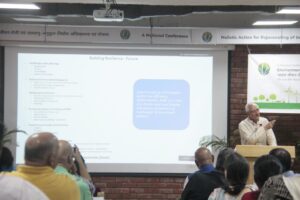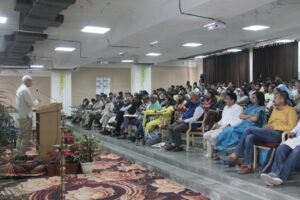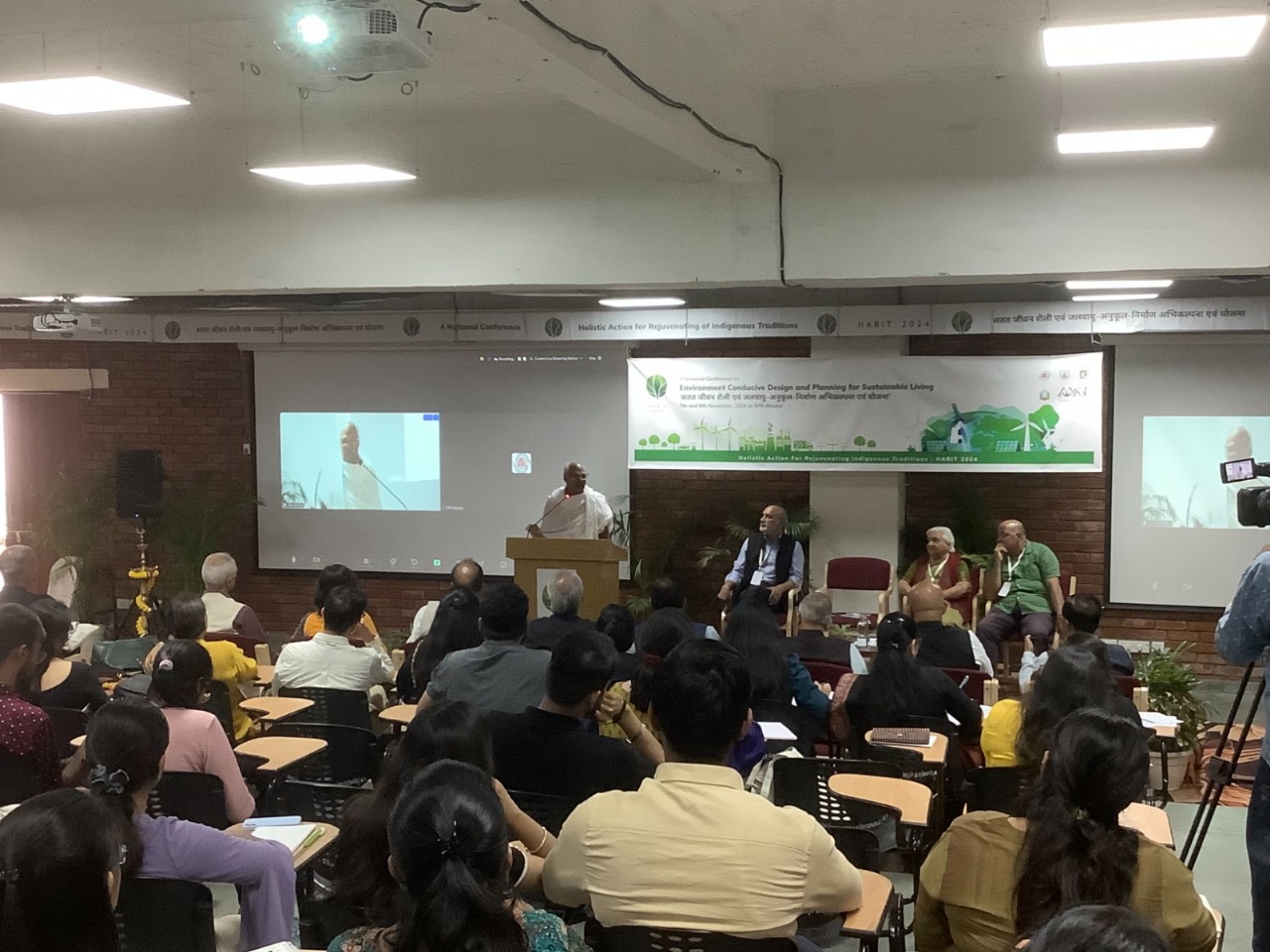CNN Central News & Network–ITDC India Epress/ITDC News Bhopal: During the two-day national conference, six panel sessions on various topics were conducted. Padma Shri awardee Mahesh Sharma, an environmental conservationist and social activist, discussed the “Shiv Ganga” movement, a community-led initiative in Jhabua, Madhya Pradesh, which focuses on water conservation through rainwater harvesting, groundwater recharge, and afforestation. This initiative has successfully rejuvenated the local ecosystem and reduced migration by improving agricultural productivity.
Padma Shri Janak Palta McGilligan, founder-director of the Jimmy McGilligan Center for Sustainable Development in Indore, discussed practical models for sustainable living, highlighting how education and empowerment of rural women can address environmental challenges through renewable energy, organic farming, and health promotion.

Prasad Devdhar, director and founder of Bhagirath Gram Vikas Pratishtan in Goa, focused on improving health by using biogas for energy and sanitation, reducing dependency on LPG, and controlling harmful emissions from open-fire cooking. S. Vishwanath, director of Biome Environmental Trust and Water Wisdom in Bengaluru, presented on traditional watershed ecosystems and their role in current and future urban and rural water management. He emphasized groundwater recharge, lake and well cleaning, and community-led practices for water security, including the role of women in tank cleaning.
Professor Chitrrekha Kabre, a faculty member in SPA Delhi’s architecture department, explored regenerative design and biocentric approaches to address climate challenges. She emphasized the role of indigenous architecture in reducing greenhouse gas emissions and mitigating environmental impacts.
Surbhi Tomar from Environment Conservation Activity discussed energy use in building construction and operation, using homes and schools in Jaisalmer as examples. She also highlighted the use of bamboo as a construction material that can substitute steel, referencing Norwegian wooden skyscrapers for possible adaptations locally. Architect Habib Khan, chairman of SPA Delhi’s governing board, discussed the need for sustainable development, interdependence with nature, and a shift in mindset. He described a philosophy that combines spirituality and environmental psychology, embodying respect for communities, climate, and nature.

Arya Chavda, author, artist, speaker, and environmental activist from Ahmedabad, emphasized community-based and youth-led local solutions in environmental psychology. Binisha Payattatti, executive director of the International Institute of Waste Management, Bangalore, spoke on the circular economy and recycling, presenting case studies of CNG plants in Bhopal and Hyderabad converting waste into energy.
Architect Sandeep Virmani, director of Hunnarshala in Bhuj, emphasized the use of local materials in building construction and shared experiences from Bhutan, Bihar’s flood-affected Mithilanchal area, earthquake-prone Gujarat, and Muzaffarnagar. Architect Amogh Kumar Gupta, chairman of SPA Vijayawada’s governing board, advocated for integrating Vastu into architectural education and emphasized experiential learning over exploitation-focused development in architecture and engineering.
Lokendra Balasaria, an urban ecologist from Ahmedabad, raised awareness about carbon emissions from diesel cars, neurotoxins in everyday products, and the role of rainwater harvesting for urban water security. Anshu Sharma, co-founder of SEEDS and partner at STS Global, discussed indigenous practices for community initiatives. Rajan Kotaru, chief technical advisor of the Indo-German program, emphasized a multi-stakeholder approach for the Himalayan region.
Architect Kriti Dhingra, principal architect of Sanshraya Design Studio, Dharamshala, shared information on construction materials made of clay and organic matter for local architecture. Dharmesh Jadeja, founder-executive of Deustudio, Auroville, discussed housing revitalization through design and architecture. Architect Sanjeev Shankar shared experiences working with communities.
The closing session’s chief guest, Gopal Arya, national coordinator of the Environment Conservation Activity, and Prof. Kailasa Rao, director of SPA Bhopal, discussed the conference recommendations. The conference coordinator, Prof. Rama Umesh Pandey, extended a vote of thanks.
#ClimateResilience #SustainableConstruction #SPABhopalConference







